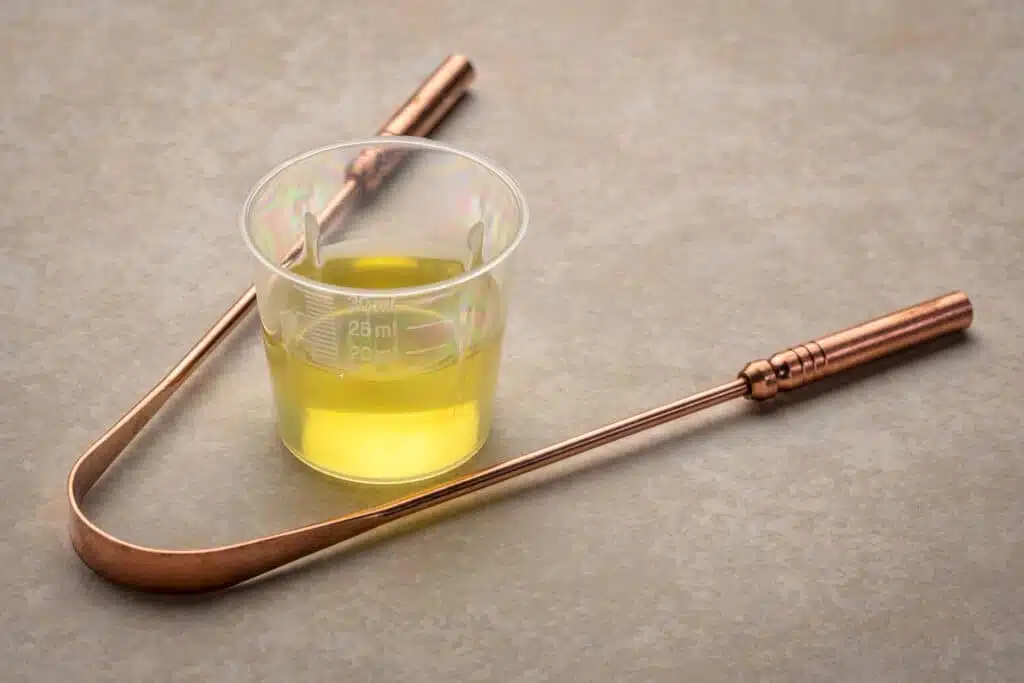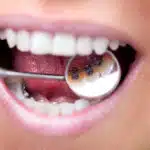Oil pulling as a supplement to dental care: what are the benefits, are there risks and does it whiten teeth? You can find all the information and tips here.
For many people, daily oral hygiene is an integral part of everyday life – brushing, flossing and mouthwash are often part of it.
However, in addition to these common methods, an old practice is becoming increasingly popular: oil pulling.
Perhaps you have already heard of this technique and are wondering whether it can really be a useful addition to dental care.
In this article you will learn everything you need to know about oil pulling, how it works and what benefits it can have for your teeth and gums.
| Get 150 € discount on your dental correction! |

Book a consultation appointment now at a nearby DrSmile partner practice and find out if teeth straightening with aligners is right for you.
The appointment is completely non-binding and does not involve any costs.
With the code “THATSMILE150” you will receive 150 € discount on the treatment.
What is oil pulling?
Oil pulling is an Ayurvedic method that has been practiced for centuries. It originated in India, where it is known as “gandusha” or “kavala”.
Put a tablespoon of vegetable oil, such as coconut oil, sunflower oil or sesame oil, in your mouth and move it back and forth for about 10 to 20 minutes.
The aim is to use the oil to “draw” harmful bacteria and toxins out of the oral cavity and thus promote oral health.

How does oil pulling work?
When oil pulling, the oil is pressed through the teeth and moved through the entire oral cavity. The consistency of the oil changes over time as it becomes thicker and whiter due to mixing with saliva and the absorption of bacteria.
After 10 to 20 minutes, spit out the oil – important: not into the sink, as the oil can block the pipes! Instead, it is better to spit the oil into a paper towel and dispose of it in the bin.
The oil is said to bind bacteria, plaque and toxins due to its fat-soluble properties. As many bacteria have a fat-soluble cell membrane, the oil is said to be particularly good at removing them.
Oil pulling not only helps to clean the teeth, but also the gums and the entire oral cavity.
Benefits of oil pulling for dental health
- 1. prevention of tooth decay and plaque
Regular oil pulling can reduce the risk of tooth decay and plaque formation. Plaque is caused by bacteria that convert sugar into acid and attack tooth enamel. By reducing these bacteria through oil pulling, you can minimize the formation of plaque and thus also tooth decay. - 2. fresh breath
Oil pulling can effectively help against bad breath. Bad breath is often due to the presence of bacteria in the mouth. Oil pulling removes these bacteria, which can lead to fresher breath. - 3. gum support
Oil pulling can also help with gum care. If your gums are sensitive or irritated, oil pulling can soothe inflammation and contribute to gum health. Sesame oil and coconut oil in particular have anti-inflammatory properties that can soothe the gums. - 4. whiter teeth
Many users report an improvement in tooth color after regular oil pulling. Even if oil pulling does not have the same effect as professional teeth whitening, slight discoloration caused by coffee, tea or other foods can be reduced. - 5. general oral health
As oil pulling reduces bacteria in the mouth, it can improve the general well-being of the oral cavity. This supports your daily dental care and ensures a healthier oral environment.

Which oils are best for oil pulling?
When oil pulling, the choice of oil is crucial. Not every oil is equally effective, so you should opt for high-quality, cold-pressed oils. The most commonly used oils are
- Coconut oil: Coconut oil is particularly popular as it has antibacterial properties. Coconut oil also has a pleasant taste and is solid at room temperature, which makes it easier to ingest.
- Sesame oil: Sesame oil is traditionally used in Ayurvedic teachings. It has a mild taste and is said to be particularly good for the gums due to its anti-inflammatory properties.
- Sunflower oil: Another common oil for oil pulling is sunflower oil. It also has anti-inflammatory properties and can be found in almost every household.
| Get 150 € discount on your dental correction! |

Book a consultation appointment now at a nearby DrSmile partner practice and find out if teeth straightening with aligners is right for you.
The appointment is completely non-binding and does not involve any costs.
With the code “THATSMILE150” you will receive 150 € discount on the treatment.
How often should you oil pull?
For best results, we recommend incorporating oil pulling into your morning routine every day. You can do it straight after getting up and before brushing your teeth.
It is important that you then brush your teeth thoroughly with toothpaste to completely remove any oil residue and dissolved bacteria.
If you are just starting out with oil pulling, it can be unusual to keep the oil in your mouth for so long. You can start with 5 minutes and gradually increase the time to 10 to 20 minutes.
What do dentists say and how effective is oil pulling scientifically?
Many dentists have a positive attitude towards oil pulling, but emphasize that it is not an alternative to conventional dental care.
They see oil pulling as a supplement to tried and tested methods such as brushing your teeth with fluoride toothpaste and using dental floss.
Scientifically, there are some studies that suggest that oil pulling can reduce certain oral bacteria, which promotes better oral health.
Some studies show a moderate reduction in plaque and bacteria, especially when using coconut or sesame oil.
However, there is still a lack of comprehensive scientific evidence to clearly confirm the effectiveness of oil pulling.
Dentists therefore recommend incorporating oil pulling as an additional step in your daily oral hygiene routine, without giving up conventional care routines.

Risks and side effects of oil pulling
In general, oil pulling is considered very safe if you use it correctly. However, be careful not to swallow the oil as it is full of bacteria and toxins after use.
It can also be unfamiliar at first to keep a large amount of oil in the mouth for a longer period of time – a certain period of familiarization is therefore normal.
If you suffer from existing gum disease or other oral problems, you should ask your dentist in advance whether oil pulling is a good idea for you.
Conclusion: Oil pulling as a valuable addition to dental care
Oil pulling is a simple and natural way to supplement your daily dental care and promote oral health.
It can help reduce bacteria, prevent gingivitis and gently whiten teeth.
While it is not a miracle method, oil pulling is an effective addition to regular dental care – with minimal effort.
Simply integrate oil pulling into your morning routine and give it a try. You might notice the first positive changes after just a few weeks – for healthier teeth and a better feeling in your mouth!
| Get 150 € discount on your dental correction! |

Book a consultation appointment now at a nearby DrSmile partner practice and find out if teeth straightening with aligners is right for you.
The appointment is completely non-binding and does not involve any costs.
With the code “THATSMILE150” you will receive 150 € discount on the treatment.
FAQs on the topic of oil pulling
Here we answer a few of the most frequently asked questions about oil pulling.
What is oil pulling and what is it good for?
Oil pulling is an Ayurvedic method in which you move vegetable oil back and forth in your mouth to remove bacteria and toxins. It is said to promote oral health by preventing tooth decay, plaque and gingivitis. Oil pulling is also often used to combat bad breath and gently whiten teeth.
How often should you oil pull?
Ideally, oil pulling should be integrated into your daily morning routine. It is particularly effective to perform oil pulling directly after getting up and before brushing your teeth. You can start with 5 minutes and gradually increase the duration to 10 to 20 minutes.
Which oil is best suited for oil pulling?
The choice of oil is important. The most popular oils are coconut oil, sesame oil and sunflower oil. Coconut oil is often preferred as it has antibacterial properties and a mild, pleasant taste. Sesame oil is widely used in traditional Ayurvedic practice and sunflower oil is another good choice as it has anti-inflammatory properties.
Can oil pulling replace brushing your teeth?
No, oil pulling is a supplement to, but not a substitute for, brushing your teeth. Even though oil pulling can remove some bacteria, it should always be practiced in conjunction with thorough brushing and flossing. These tried and tested methods are essential for long-term dental health.
Is oil pulling scientifically proven?
There are some studies that point to the positive effects of oil pulling, such as the reduction of plaque and harmful bacteria. However, the scientific evidence is not yet comprehensive enough to confirm clear effectiveness. Dentists therefore recommend oil pulling as a supplement, not as a replacement for traditional dental care.
How long do you have to keep oil in your mouth when oil pulling?
Ideally, you should keep the oil in your mouth for 10 to 20 minutes. During this time, the oil will become thicker and whitish as it absorbs bacteria and toxins. If you are just starting out, you can slowly get used to this duration and start with 5 minutes.
What do you need to consider after oil pulling?
After oil pulling, you should spit the oil into the trash and not into the sink, as it can clog pipes. Then rinse your mouth thoroughly with water and brush your teeth to completely remove all oil residue and dissolved bacteria.
Can oil pulling whiten teeth?
Oil pulling can lead to a gentle whitening of the teeth, especially if discoloration has been caused by foods such as coffee or tea. However, it does not replace professional teeth whitening, but can only reduce slight discoloration and give the teeth a fresher, cleaner look.
Are there any risks or side effects of oil pulling?
Oil pulling is considered safe when used correctly. Be careful not to swallow the oil as it can contain bacteria and toxins. If you are prone to sensitive gums or already suffer from gum disease, it is advisable to consult your dentist beforehand to ensure that oil pulling is suitable for you.
At what age is oil pulling suitable?
In principle, oil pulling is suitable for people of all ages, but younger children should only do it under supervision as they may have difficulty not swallowing the oil. As soon as a child is old enough to consciously handle the oil and spit it out after pulling, they can start oil pulling.



Leave a Reply